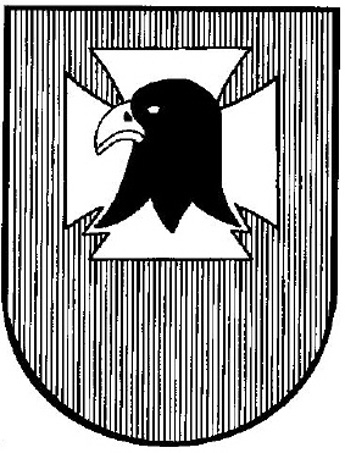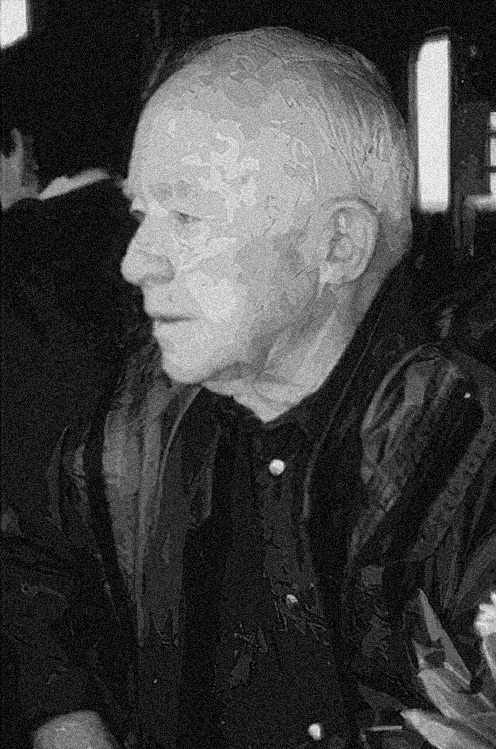
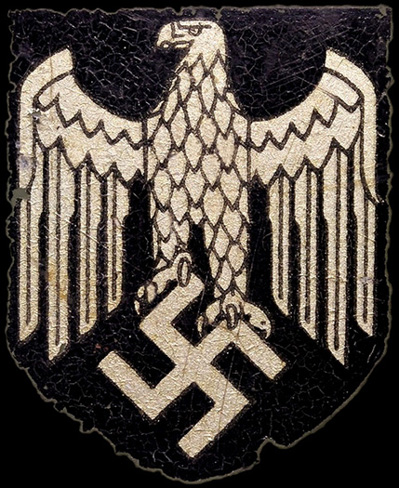
Interview with Knight's Cross winner and Assault Gun Commander of Sturmgeschütz-Brigade 259, Dietrich Ascher. Graz, Austria, 1990.
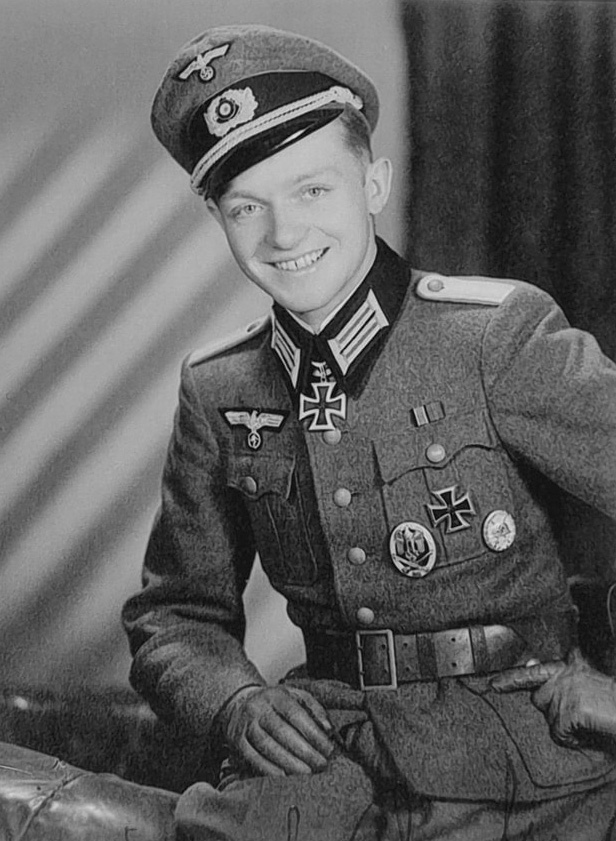



Interview with Knight's Cross winner and Assault Gun Commander of Sturmgeschütz-Brigade 259, Dietrich Ascher. Graz, Austria, 1990.


Dietrich: Yes of course, Wilhelmina is a dear friend and I am happy to allow you some time. Her daughter is always welcomed in this home, and you being her friend are fine as well.
Can I ask how you came to be in an Assault Gun group?
Dietrich: Yes, it was the start of the war when I finished school and was sent to the labor service to fulfill my obligation. I will tell you that I did not like it, as many young boys did not. We wanted to get into the war. You could leave early if you volunteered and many did.
I was among those who, being from the Ostmark [Austria], I wanted to be a mountain soldier and was quickly taken by the army mountain troops. I was close to home and in my element. During this time at the school a new weapon was emerging, the mobile artillery, and that caught my interest.
I met a very persuasive friend who was part of this new branch, and I was talked into transferring. Although I must add he did not need to give a lot of convincing. I was sent to the school in Jüterbog [north-eastern Germany] to learn all about this weapon, and to master everything about them.
You know this weapon was at first meant to be support for the infantry, to knock out bunkers and resistance nests. Later on in the war we were retrained to become tank hunters. It was at this time the weapons came into their fame; we were deadly to the enemy, inflicting heavy losses on all fronts.
Can I ask when it was that you came to the front?
Dietrich: Yes, it was in the spring of 1941 that all the military training and technical training was finally done for me. I was posted to the Stug Unit 185 [Sturmartillerie-Abteilung 185 (185th Assault Gun Brigade)] under Major [Friedrich Wilhelm] Lieckfeld. We were moved to the north side of the front that was soon to open against Stalin. It was called Army Group North and on June 22nd 1941 we moved into the Baltic States to free them from the red army.
What was the opening of the war with Russia like for you?
Dietrich: I don't really recall how I felt about it but I think I was full of hope and optimism back then. We were told that Stalin was oppressing these people and that they needed to be freed from Bolshevism. I remember the people did greet us as their liberators, I remember that well as they handed us flowers.
We started our march and there was very little contact with the red army at first. Then we came upon large forces that were scattered. We also captured large supply bases with much fuel and weapons. The first wave of attacks had broken their lines and forced either surrender or retreat. I remember the civilians cheering us as we moved captured soldiers to the rear.
I was thinking to myself that this is going to be an easy time if it stays like this. The people would call us to stop so they could offer water, as it was very hot and dusty. They gave food, water and flowers. If you were lucky a pretty girl would offer a kiss as well, the men tried to sneak two or three.
We moved very fast I recall, at times having to be called back. Our supplies could hardly keep up. One time we attacked a column of Soviet trucks and took all the fuel so we could keep going. We told the ones who surrendered to wait for the others, I always wondered if they waited.
All through this area it was the same scene, the Soviets would put up a fight, then break and run. We would capture a town and the people would throng to us, thanking us for freeing them. In one town we came to they rose up and killed the soldiers themselves with old weapons.
We would stay with the people at night, that was a good time. We would be ordered to stop and rest for a couple of days to catch up on repairs and so forth. The townspeople always put on a feast and party for us. There would be much eating and good times. I sometimes wondered if we really were at war.
It was not until that July and later that we really started to run into trouble. Once we broke into Russia the reinforcements from the east started coming. They would have better defensive lines that would take coordinated assaults with Stukas to break.
Our unit was directed up towards the Leningrad front, and the armor became more common. They had some large numbers here but were very disorganized, this allowed our forces to overcome them. It was on that front I was wounded by hits to our gun and finally sent back home for more training in 1942.
Did you go through the winter of 1941-42 in the east?
Dietrich: Yes I was there, and we were given a medal for that time, we called it the 'frozen meat medal'. And you know why they called it that, because it was so damn cold our meat froze in our pants. You had to stuff yourself with any rags or anything you could find to keep warm.
Lucky for us we had undamaged villages near our lines and the people helped keep us warm. We did have to go out and gather firewood in temperatures as low as -40 below. Pulling guard duty had to be limited as well; it was so cold at times that water would freeze in the air when thrown. I saw some soldiers who had gotten frostbite due to worn socks or lack of warm clothing.
In a sad instance I even saw our men take warm clothing from prisoners who were being moved west. This was forbidden and the clothing was returned. The men were told to use blankets and uniforms from the dead. In one village we were in, we stayed in a garage of a mechanic. He had a big homemade stove and it warmed the place very well.
We had to keep it secret so more men did not make it unlivable due to space.
We kept it even more secret when a home was burned down by careless soldiers using their oil lamps. The family had to be put up in an already overcrowded home. That was our life during that winter. We had to find ways to keep warm as best we could. The engines would not start, weapons froze shut, it was miserable.
Stalin was smart, he had ordered the red army to burn and destroy everything in their retreat path. Houses, towns, farms, fields and wells were destroyed. The goal of course was to deny us their use. It also burdened the civilians whom we then had to care for, sapping our already stretched supplies.
To make this even worse, the Soviets launched counter-attacks in the north to save Moscow. This caught us by surprise and they tore through our weak and lightly defended lines. We had to fight hard to repulse these fresh troops; one good thing was they were well dressed and supplied. Men had to take their warm boots and uniforms when they fell.
At this time we had lost some in our unit, and others became sick so it was a very hard time. Our leaders did well by staying out with us to show they were bearing our burdens and not hiding. It became so cold that for a few weeks it was calm. All each side wanted to do was stay warm and survive the brutal weather.
There was even a report I heard where Soviet soldiers traded for items in a quiet area. I never saw this but I could see it happening. As I mentioned, I was wounded and this caused me to be sent back home which led to a training course that lasted a while as I thawed out.
[Above: StuG III Ausf.F/8.]
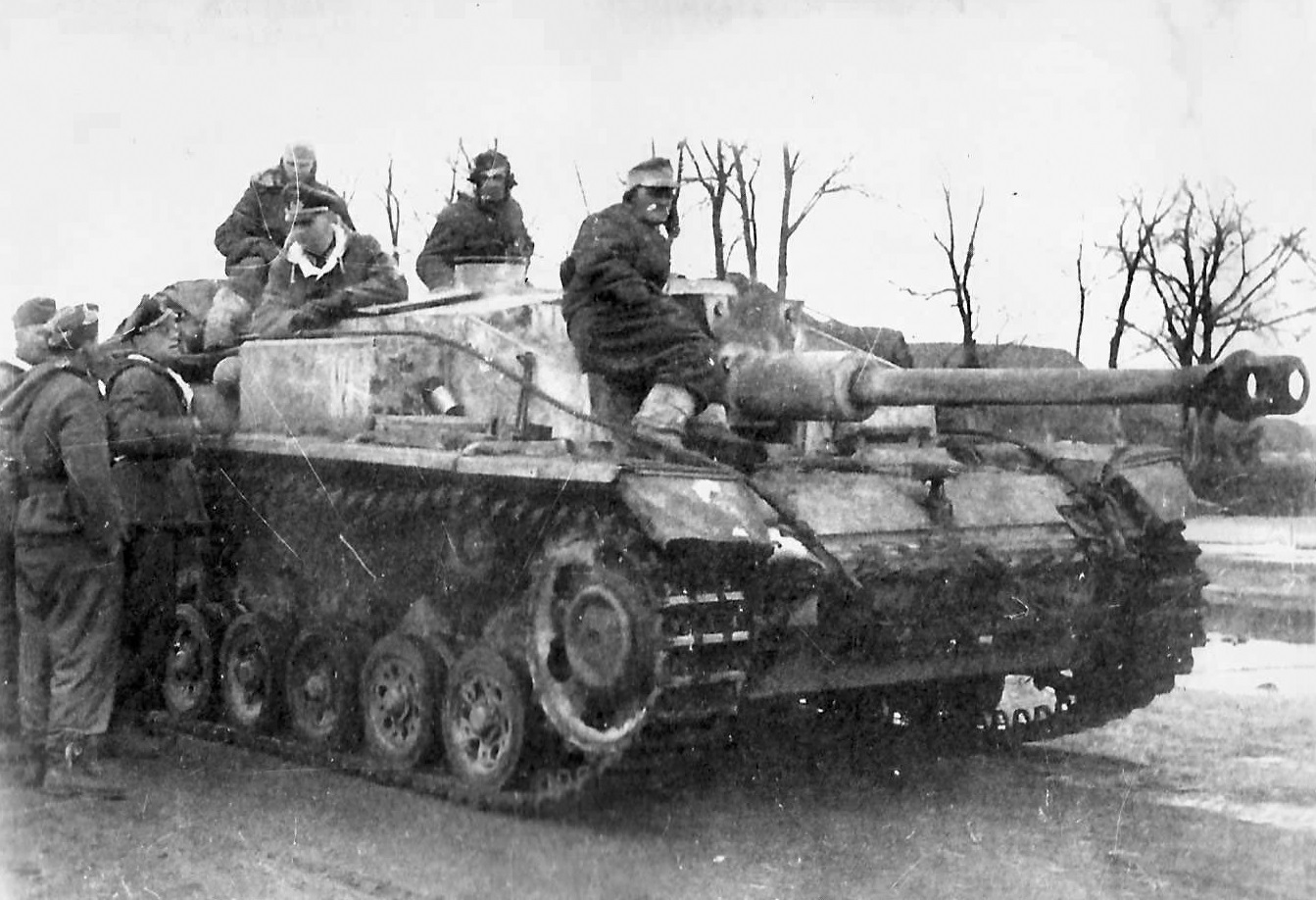
I am always curious to ask how the Russian civilians viewed you and how did German forces view them? It has been said the Germans treated them very badly.
Dietrich: I can tell you with honesty, as I was there and saw with my own eyes, they were treated very well. We understood we were invaders to some, but to many we were liberators. Many Russian people hated Stalin and the Soviet system, when we came into Russian land they came to us with friendship. Those loyal to the state fled to fight, or hid and became partisans later on.
I saw the religious ones come out and welcome us with the holy cross; they were not allowed to worship under the Soviet system. I saw the old Czarist churches that the Soviets turned into storage centers, tore down, or used as farm stalls. They were all run down with no one being allowed to keep them active.
When we arrived I saw the people come out and thank us, and then went right to work cleaning out these churches. Many of the priests had been driven away, killed, or sent to camps. We had Russian interpreters who were bombarded with requests to find missing family who the Soviet state sent away.
I know they tell us that later on the police and rear area troops came and did bad things to them, and if it's true they had every right to hate us. I just never saw anything like what they tell us after the war. I will tell you young man that I have met Russian businessmen who have said the stories are lies.
They told me in confidence that German forces were not as bad as uncle Stalin said, in fact many Russians that are on the books as being killed by Germans, were killed by the NKVD [Soviet secret police] for helping us. That it something I could easily believe because I saw Russian people helping us even up until 1944 when we retreated into the Baltics.
Let me tell you about one time, our gun threw a track after running over some bad ruts in the road. To say Russia had any roads is a joke; they were so backwards that all they had were dirt lanes. We had to stop and our jack broke, so we were stuck. A farmer came who could speak no German.
He was smoking this ungodly big pipe with the smelliest tobacco I remember. He laughed at us, and motioned for one of us to come with him. I went, and he took me to his farm, where he salvaged parts, and he had two jacks that would work for us. He took me back, helped us re-track the gun, all while smoking his smelly pipe.
Keep in mind this was during our retreat and we could hear fighting in the distance, so it was a little unnerving. A comrade stayed on guard in case the Soviets appeared. We offered him some German cigarettes, but he refused and seemed to mock the mildness of ours. We thanked him and went on our way.
So I can not speak for all of our soldiers, or the SS, but I never saw anything that would make me think the Russians, or any other civilians were being mistreated. I know our medical doctor would freely treat Russians when we were in relaxed quarters. There were even areas of Russia where Jews lived, and we left them alone.
Could you tell me about that? I am very curious about what happened to the Jews in the east?
Dietrich: No, that is something I will not discuss with anyone. I do not know anything about it and frankly do not want to be drawn into something that the wrong conclusion could be given. I will say if it is true then it is a shame and should never have happened. The German army had nothing to do with any of the business of the Jews.
I know there has been a trend it seems by Allied veterans to claim that the German army is just as guilty as the SS in regards to war crimes. Did you see any examples of this in regards to the army committing crimes?
Dietrich: Ahhh, I tread lightly with this my boy. I have told you I did not see anything like this and would have revolted if so. I would perhaps say that maybe the veterans are embellishing stories. I too have read accounts of your soldiers in our papers. One article that caught my eye was a soldier claiming German soldiers would shoot retreating comrades.
This is false in my eye, as I lived the war. There were times when retreat was the only way to save a command or unit. This happened very often so that a new battle line could be created. It is ridiculous for him to have said that. He should have said that in wartime deserters are shot by all armies.
That was true in ours, like in all armies, if you leave your post without orders and are trying to shirk your duty then you could be shot. At the end of the war I know that it did happen, but it was not widespread and only happened in extreme cases. I know of none personally.
I will also tell you that this war was a new type of war in that there was an organized resistance behind our lines later on. Agents were sent in to stir up the people and bands of civilians went out to fight or sabotage German forces. This was against all the rules of war, so when they were caught or captured they were punished. For their actions they were labeled as spies and saboteurs.
This is all I wish to say about this topic.
Ok, I understand and thank you for speaking about this. I know you won the Knight's Cross, can I ask how it was won?
Dietrich: The Knight's Cross was a very high medal back then, and it was not easily handed out. You had to earn the Iron Cross in both the 2nd and 1st classes before being considered for the Knight's Cross. I already had both classes by 1945, due to the many battles we had been in.
My award came late in the war, we were fighting in the east, and moved into the Baltic States, and then back into Reich territory. By now I was with the long gun, and was very successful at knocking out Soviet tanks.
We were used as a force to move from one hot place to another, we called ourselves fire brigades as we quickly went to where a breakthrough had happened. We would counter-attack, driving the enemy back, and then move on to the next.
We did not get much time to relax as the front was very active in the last months of the war. The Soviets had broken through in many places and this kept us moving from one sector to the next. My crew had a very good count by now, and we knew how to take on the best of Soviet tanks.
For the multiple successful counter-attacks and the kill numbers we had I was put up for the award. I received this in February 1945 and barely had time to give it any wear when I was wounded. I was one of the lucky ones as I was put on a ship and evacuated.
[Above: Dietrich Ascher.]
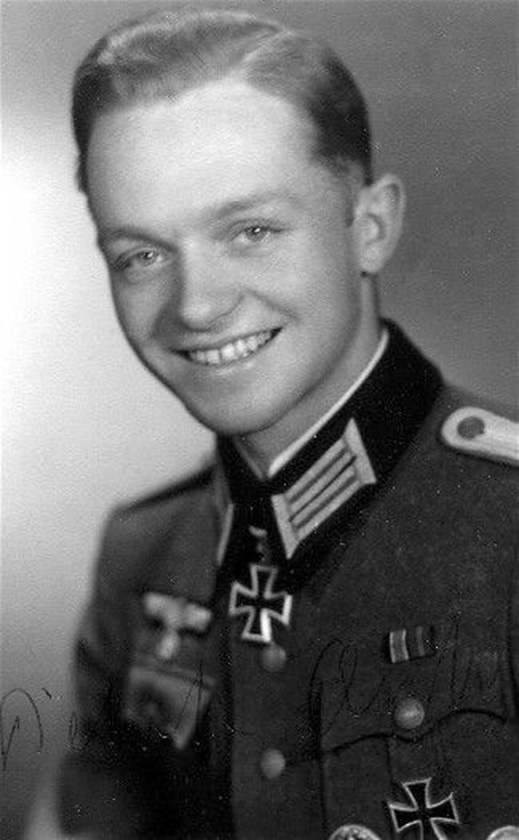
I understand the Wilhelm Gustloff was sunk after picking up people leaving the east. Did you know about it?
Dietrich: Ahh, not many people outside Germany know that name. You know that ship was sunk by a Soviet sub and is the largest loss of life in maritime history [on January 30, 1945, some 9,000 people, mostly civilians, perished in this ruthless attack-Ed.]. I barely remember those times but I remember seeing countless people, military and civilian, seeking to get away. The Soviets had us trapped.
The Kriegsmarine had moved all their ships to East Prussia to help evacuate us unfortunate souls. It was a huge pocket that had several remnants of divisions holding off the red army. This allowed for many millions to be moved safely to the Reich. That ship was loaded with many thousands of souls.
We did not really learn of its sinking until after the war, it was a tragedy without equal. The Soviets knew we were evacuating civilians which mercy should have spared. They took advantage of sad times just to get a kill, shameful.
I am told many of the dead came to shore thankfully so they at least received a proper burial, but they are all unknown. Let us hope nothing like this ever happens again as the loss of life is very hard to fathom. The killing still went on after this.
There are also lesser known ships that were sunk as well, all with unimaginable loss of life. One had a few thousand inmates from a labor or concentration camp I have learned, and the British sunk it with no survivors [this was on May 3, 1945. 6,000 concentration camp prisoners were killed when British bombers sank the 'Cap Arcona', a German passenger ship, and the 'Thielbek', a cargo ship]. I know there were also Luftwaffe planes taking soldiers and civilians out as well.
A friend of mine lost his brother during this time; he was a pilot flying people out of the pocket and was shot down. I was counted as a fortunate one as I made it out to be treated and ended the war in a hospital.
Can I ask an odd question, do you think Germany could have won the war?
Dietrich: I think you have to ask yourself why we lost the war. From my perspective, we had the better training and our weapons were more advanced. It all comes down to numbers for me. Germany was a small nation compared to say America or Russia; we were equal to France and Britain.
We won against France due to a new type of offensive war that caught the Allies off balance. This worked against the smaller nations as well, but we still took our losses, you can be sure of that. When the material battle changed due to America coming in, that was the end for us.
I believe if we would have fought each nation separately, we had a good chance of winning. Fighting them all together was impossible, and our leaders knew it. We were like the Spartans, fierce, well-trained and disciplined fighters, but in the end the numbers did us in.
If you are asking if we could have won within different scenarios, then we would have needed to capture the BEF [British Expeditionary Force] at Dunkirk, knock Britain out of the war by sticking to hitting the RAF [Royal Air Force], and building more U-boats early. Next, attack Stalin in April of '41, drive to the north to cut off Murmansk [Murmansk served as the main port for Anglo-American convoys carrying Lend-Lease war supplies to the Soviet Union], and in the south capture the oil fields.
Although I have read America was waging a secret war against us, so that is why Hitler declared war, we keep peace. Doing so will allow the fall of Russia, and likely the Afrika Korps defeats Montgomery, joining up in the oil fields. I believe this was Hitler's strategy but events happened to dictate other courses.
America was the key; if we kept you out of the fighting then Germany had a very good chance to win. It would have helped to have had even better relationships with Japan so that we could have gotten them to attack Stalin as well. In the end they paid for not being aggressive with Russia.
All of this is speculation for sure, but if we could have knocked Russia out early with more troops in the fight, and taken his oil, it would have changed things. He would not have had those convoys bringing him tanks, planes, weapons, oil, and supplies. With no eastern front then peace discussions could have been entered with the west.
I know we did not want to fight Britain, the English were never our enemies and it's a shame we have fought in two wars now. War is such a tragedy for us Europeans, and we never seem to learn from this. They are starting up in the Balkans again I am reading with the fall of the Iron Curtain.
Do you have any regrets that you lived and fought in that time?
Dietrich: I could do without the snow, mud, and cold of the eastern front, I can tell you. I must say that I regret nothing of that time. Look, we were soldiers who were called to defend our nation. We were thrust into our fate and we can not hide from it or deny it. I lost too many comrades to say I have regrets.
I do regret so many good men had to die, I regret that a mother, who lost her two sons and husband, took her life at war's end. I regret that so many innocent children died in the bombings. But I can't have regrets for something I do not regret.
I served with honor as did my comrades and we serve each other still to this day. We remember those who fell and the ones they left behind. We have a duty to them to never forget those times. We did not want war; we hated the idea of fighting.
We did our duty to our oaths and country. Wars take two sides to fight; Churchill should be blamed as much as Hitler for the war. However I have found that when you lose a war you do not get to say things like this.
The war took so much from us, and I can tell you just because some historians or "experts" doing a TV show say something happened one certain way does not make it true. Our society is putting too much trust in paid "experts" who today claim we soldiers did all these horrible things.
I regret that we can not correct the story, we have been placed in the rubbish bin I am afraid. So many good men, honest and caring men, died. Yet they are treated as if they didn't matter, that we were just ignorant followers of criminals. Calls today are being sounded to remove the names of German heroes from barracks. It's sad.
[Above: Insignia of the Sturmgeschütz-Brigade 259.]
[Above: Dietrich Ascher.]
